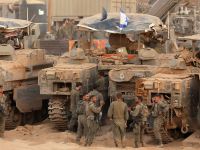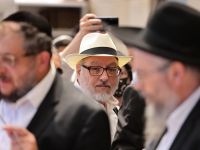Convening for the first time in the Occupied Territories, Israel's "security cabinet" met Wednesday in the West Bank settlement of Ofra, where on Tuesday a man was killed in a Palestinian ambush, said AFP.
Led by Prime Minister Ariel Sharon, nine of the 13 ministers who regularly attend the restricted cabinet sessions took part in the meeting, where they heard reports on security from Chief of Staff Shaul Mofaz and other senior officers.
"Our aim is to achieve a return to security. That demands patience, perseverance and intransigence. But no political consideration is going to restrict our efforts to restore security," Sharon said before the meeting, according to the agency.
Assaf Hershkowitz, a 31-year-old settler, was killed early Tuesday when he was fired on by Palestinian assailants as he drove to work from his home in Ofra, north of the town of Ramallah.
ISRAELI TROOPS KILL PALESTINIAN YOUTH, INJURE 15 IN GAZA STRIP
Israeli troops shot dead a Palestinian youth and wounded 15 others on Wednesday inside the autonomous Palestinian region of Rafah in the south of the Gaza Strip.
Mahmoud Akel, 17, died after being shot in the chest during exchanges of fire between Palestinians and Israeli soldiers who had entered several meters inside the Rafah sector backed by two tanks and two bulldozers which razed two houses before withdrawing, a Palestinian security official said, cited by AFP.
The incidents occurred after the Palestinians fired mortar shells at the Neve Dekalim Jewish settlement in the south of the Gaza Strip, without claiming any casualties.
According to the Israeli Haaretz newspaper, Israeli troops and Palestinian gunmen exchanged heavy fire near Ramallah, but there were no injuries.
The paper added that mortars landed at the settlement of Morag in the Gaza Strip.
The paper added that a Palestinian was reportedly killed by a masked gunman in the West Bank town of Qalqiliyah, after he was accused of collaborating with Israeli security forces.
Also, three Israelis were injured in two shooting incidents, while driving in the West Bank; two of the victims are Israeli Arabs, the paper said.
SHARON SAYS ARAFAT RESPONSIBLE FOR ESCALATING SITUATION
On Tuesday, Sharon held Palestinian President Yasser Arafat responsible for the latest surge in violence, saying Arafat has complete control over events and is running terror groups.
"The prime minister holds the Palestinian Authority, which is not fighting terror and its infrastructure, responsible for the escalation in violence," his office said in a statement, cited by Haaretz.
The Palestinians retorted by blaming Israeli military occupation for the escalating situation.
Top Palestinian negotiator Saeb Erakat on Tuesday accused Israeli Foreign Minister Shimon Peres of failing to honor a pledge to ease restrictions on Palestinian territories, said AFP.
"What we are hearing are press statements directed at public opinion and alluding that there has been an easing of restrictions here and there, but the reality on the ground is different," Erakat told Jordan state television.
"Up until now on the evening of May 1, 2001, Gaza airport is still totally closed, the sea off Gaza is off limits to Palestinian fishermen and the (land) blockade is total in Gaza and the West Bank," Erakat said.
Peres promised Sunday an easing of the restrictions imposed by Israel on the Palestinians since the start of a bloody Palestinian uprising against Israeli rule seven months ago.
MIDDLE EAST PEACE PUSH OVERSHADOWED BY VIOLENCE
On Tuesday, diplomatic efforts to curb the violence and prepare for peace talks took a further knock amid Palestinian funerals marked by calls for revenge and accusations the Israeli army was engaged in a campaign of murder, said AFP.
May Day in the Middle East reeled from eight deaths in less than 24 hours, deep two-way mistrust between Israelis and Palestinians, and little sign of diplomatic headway.
Palestinians buried five of their dead from separate explosions Monday in Gaza and the West Bank town of Ramallah, amid calls of revenge and voiced suspicions that the blasts were further assassinations by the Israelis.
Two members of the Islamic militant movement Hamas were killed when a powerful bomb blew apart their car in the center of Gaza City and tore large chunks of concrete from a nearby building.
Palestinians suspected an Israeli army remote-control device, and Hamas followers called for revenge as the two were interred.
The Israeli army was also blamed for the death of two Palestinian children and a Palestinian activist wanted by Israel in the Ramallah blast.
But Israeli Defence Minister Binyamin Ben Eliezer forcefully rejected Palestinian claims of Israel being behind the Ramallah blast, said Haaretz.
"We have no hand in this," Ben Eliezer said on Israel military radio, cited by the paper.
"This is exactly the process by which they prepare explosive material and they have many explosive working accidents, after which they blame us. There is no border to their gall."
An Israeli military spokesman also denied the army's involvement with the other explosion.
During the Gaza funeral, Hamas claimed responsibility for the murder of a Jewish settler on Tuesday morning on a road in the West Bank.
A member of the movement's Ezzedin al-Qassam militant brigade said it was the first of a series of reprisals for the two Hamas members killed in Gaza and the three other Palestinians in Ramallah, AFP added.
An Israeli settler was killed after his car came under fire as he travelled to work near the West Bank town of Ramallah, and Palestinian officials said a police officer was killed by Israeli tank fire near the Rafah crossing-point between the Gaza Strip and Egypt.
The killings cast a pall over attempts by Peres to interest the United States in the latest efforts to end the violence.
Peres is holding talks with US leaders on a Jordanian-Egyptian peace plan, under which Israel would lift its siege of Palestinian-controlled areas and pull back its troops, in return for the Palestinians resuming security cooperation.
He told Egyptian television Tuesday that Israel counts on Egypt's "important support" in Israeli-Palestinian peace efforts, adding: "We want to reach a ceasefire (between Israel and the Palestinians) and a resumption of negotiations as soon as possible, the agency quoted him as saying.
"I think Egypt and its president Hosni Mubarak can bring important support," said Peres, adding this was the reason of his visit to Egypt Sunday.
But Peres, under fire over the lack of a clear conclusion to his Egyptian visit, was also criticized by the Palestinians Tuesday for not delivering on promises.
Meanwhile, Jordan's King Abdullah II said Tuesday that Israeli military escalation in the Palestinian territories harms efforts underway to quell the violence and bolster chances for renewed peace talks, reported the official Jordanian news agency, Petra.
The king made the remarks during nearly one hour of talks with Arafat at the king's private home of Beit al-Baraka in Amman, court officials said.
Later, the king discussed the situation with UN Secretary General Kofi Annan.
In another development, Palestinian cabinet minister Nabil Shaath urged Britain on Tuesday to play a more active role in efforts to end Arab-Israeli violence, saying London was wrong to resist putting public pressure on Israel.
Planning Minister Shaath, speaking before talks with British Foreign Secretary Robin Cook, said Britain and its European partners needed to be more assertive in the Middle East, Reuters quoted him as saying.
"My message [to Cook] is that we need to see an active European policy supported by an active British policy," Shaath said in a telephone interview - Albawaba.com
© 2001 Al Bawaba (www.albawaba.com)







